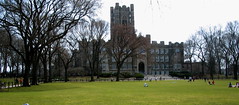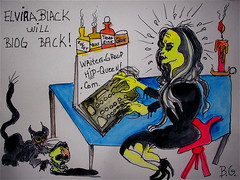On February 1, the first day of Black history Month was ushered in with a bit of
local media brouhaha here in New York when Queens Councilman Leroy Comrie, hip-hop artist Kurtis Blow Walker, and other community leaders headed a press conference calling for a symbolic, non-binding resolution urging New Yorkers to stop using the "n" word. Though no one could possibly imagine this could be made into a real law (just for starters, the First Amendment implications would be huge) it did give people of all races ample food for thought.
Black spokesmen such as the Reverend Jesse Jackson and Al Sharpton have spoken out for decades about racism in America. Bill Cosby has been very open about the willful rejection by many black youths of education as a way out of poverty and the peer pressure faced by those who study hard and are mocked by their peers for “acting white.”
The point we are at now in America, Jackson and Sharpton claim, is that most whites feel that racism is now a non-issue, while many blacks know it’s just been pushed under the “PC” surface. The frustrating thing about this underlying, even unconscious, racism is that it’s so insidious that white people don’t even realize they are still bigoted.
So if Black History month is to live up to its name, it seems logical to assume that the implications of the “n” word, its role in racism, and the black struggle for equal opportunity are vital issues to explore. Bringing this topic into the light of day has considerable merit to it, especially since young people who use the word as a term of affection seem unaware of the negative historical connotations. They didn’t live through the civil rights movement and may be unaware that some dedicated people, black and white, died for this noble cause.
They may have little clue as to the horrible and shameful history of discrimination, segregation, lynchings, redlining, and slavery that decimated the black family unit and perpetuated a tragic cycle of multi-generational poverty. The repercussions of this appalling American legacy are still being felt today.
Save for the equally-oppressed Native American, all Americans' roots lie elsewhere. Our ancestors fled oppression and lack of opportunity in the old country and braved the journey to the new land with its siren song of “Give me your tired, your poor, your huddled masses yearning to break free.” The crucial difference between African Americans and other "immigrants" is that blacks were brought here against their will in the service of oppression rather than liberation. Conversely, the vast waves of European immigrants who began to arrive in earnest at the turn of the twentieth century personified the typical road to assimilation taken by those from other countries and cultures who come here.
My grandparents, for instance, came from Eastern Europe and settled, like so many others, on the Lower East Side of Manhattan early in the last century. My grandfather worked hard to support his wife and five children, but died at a very young age, leaving my non-English speaking grandmother to care for her American-born children in a cramped walk-up tenement.
In order to survive, my mother and her older brother had to complete their high school degrees at night so they could work during the day. My grandmother insisted that everyone finish high school, as she knew this was necessary in order to move ahead and succeed in America. Like many children of new immigrants, my mother, aunts, and uncles wasted no time in trying to escape the ghetto life they had been born into. As fully assimilated Americans, they wanted to move out of the old neighborhood at all costs.
My mother and her youngest sister were especially adamant about this. When they double dated, they didn’t want their dates to pick them up from home. They broke from their Orthodox Jewish religious traditions, spoke perfect English, and succeeded in fulfilling the American dream in earnest. Only one of my aunts — an Orthodox Jew — still lives in the old neighborhood (what my other aunt also refers to as the “schtetl”). Like some others of her generation, she chose to stay in a working class co-op development that had been designed by Jewish union leaders early in the century to provide the working and middle class with decent, affordable housing and an escape from the cramped tenements a block or two away. For decades — until a discrimination lawsuit changed all that — the massive high rise co-ops up and down Grand Street on the East Side were, indeed, virtual Jewish enclaves.
In this safe haven, American-born Orthodox Jews could escape the pressures of full assimilation and retain their essential “Jewishness” without shame or apology. As a result, it is quite easy to tell at first sight (and sound) that my aunt is Jewish. She talks and looks like a stereotypical Jew, though she worked for years in a mostly Chinese school district as a secretary and got along with everyone. But until recently, time really did stand still — at least culturally — on Grand Street.
READ MORE HERE




